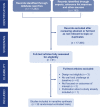Allergen immunotherapy and/or biologicals for IgE-mediated food allergy: A systematic review and meta-analysis
- PMID: 35001400
- PMCID: PMC9303769
- DOI: 10.1111/all.15211
Allergen immunotherapy and/or biologicals for IgE-mediated food allergy: A systematic review and meta-analysis
Abstract
Background: There is substantial interest in immunotherapy and biologicals in IgE-mediated food allergy.
Methods: We searched six databases for randomized controlled trials about immunotherapy alone or with biologicals (to April 2021) or biological monotherapy (to September 2021) in food allergy confirmed by oral food challenge. We pooled the data using random-effects meta-analysis.
Results: We included 36 trials about immunotherapy with 2126 mainly child participants. Oral immunotherapy increased tolerance whilst on therapy for peanut (RR 9.9, 95% CI 4.5.-21.4, high certainty); cow's milk (RR 5.7, 1.9-16.7, moderate certainty) and hen's egg allergy (RR 8.9, 4.4-18, moderate certainty). The number needed to treat to increase tolerance to a single dose of 300 mg or 1000 mg peanut protein was 2. Oral immunotherapy did not increase adverse reactions (RR 1.1, 1.0-1.2, low certainty) or severe reactions in peanut allergy (RR 1,6, 0.7-3.5, low certainty), but may increase (mild) adverse reactions in cow's milk (RR 3.9, 2.1-7.5, low certainty) and hen's egg allergy (RR 7.0, 2.4-19.8, moderate certainty). Epicutaneous immunotherapy increased tolerance whilst on therapy for peanut (RR 2.6, 1.8-3.8, moderate certainty). Results were unclear for other allergies and administration routes. There were too few trials of biologicals alone (3) or with immunotherapy (1) to draw conclusions.
Conclusions: Oral immunotherapy improves tolerance whilst on therapy and is probably safe in peanut, cow's milk and hen's egg allergy. More research is needed about quality of life, cost and biologicals.
Keywords: IgE-mediated; biological; food allergy; immunotherapy; peanut.
© 2022 The Authors. Allergy published by European Academy of Allergy and Clinical Immunology and John Wiley & Sons Ltd.
Conflict of interest statement
Debra de Silva, none declared. Organisation received GA2LEN funding to support review process. Pablo Rodríguez del Río, Personal fees: Aimmune, Nicolette W. de Jong, none declared. Ekaterina Khaleva, none declared. Chris Singh, none declared. Organisation received GA2LEN funding to support review process. Anna Nowak‐Wegrzyn, Personal fees: Nestle, Novartis, Sanofil. Antonella Muraro, Personal fees: Aimmune, DVB, Mylan, ALK, Nestle, Novartis, Nutricia Research. Grant: Aimmune, Sanofil. Philippe Begin, Personal fees: ALK, DBV, Novartis, Sanofil, Giovanni Pajno, none declared. Alessandro Fiocchi, Personal fees: Ferrero. Grant: Danone, HIPP. Angel Sanchez, none declared. Carla Jones, none declared. Organisation received funding to support projects. Caroline Nilsson, Grant: Aimmune, Thermofisher. Carsten Bindslev‐Jensen, Personal fees: Allakos, CEV SA. Grant: Novartis. Gary Wong, none declared. Hugh Sampson, Personal fees: DBV, N‐fold, Siolta. Kirsten Beyer, Personal fees: Aimmune, Bencard, Danone, DBV, HIPP, Hycor, Infectopharm, Jenapharma, Mylan/Meda, Nestle, Novartis, Nutricia Research, Thermofisher. Grants: Aimmune, Danone/Nutricia/Milipa, DBV, Hipp, Hycor, Infectopharm. Mary‐Jane Marchisotto, none declared. Montserrat Fernandez Rivas, Personal fees: Therapeutics, ALK, Allergy Therapeutics, DBV, Diater, GSK, Thermofisher Scientific, SPRIM. Rosan Meyer, Personal fees: Abbott, Danone, Nestle, Mead Johnson. Susanne Lau, none declared. Ulugbek Nurmatov, none declared. Graham Roberts, Grant: UK Food Standards Agency, DBV, European Union.
Figures
References
-
- Nwaru BI, Hickstein L, Panesar SS, et al. The epidemiology of food allergy in Europe: a systematic review and meta‐analysis. Allergy. 2014;69(1):62‐75. - PubMed
-
- Polloni L, Muraro A. Anxiety and food allergy: a review of the last two decades. Clin Exp Allergy. 2020;50(4):420‐441. - PubMed
-
- Pouessel G, Turner PJ, Worm M, et al. Food‐induced fatal anaphylaxis: from epidemiological data to general prevention strategies. Clin Exp Allergy. 2018;48(12):1584‐1593. - PubMed
-
- Eiwegger T, Anagnostou K, Arasi S, et al. Conflicting verdicts on peanut oral immunotherapy from the institute for clinical and economic review and US food and drug administration advisory committee: where do we go from here? J Allergy Clin Immunol. 2020;145:1153‐1156. - PubMed
Publication types
MeSH terms
Substances
LinkOut - more resources
Full Text Sources
Medical
Miscellaneous


